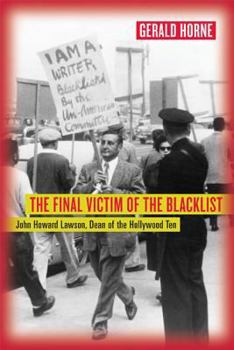The Final Victim of the Blacklist: John Howard Lawson, Dean of the Hollywood Ten
Select Format
Select Condition 
Book Overview
Before he attained notoriety as Dean of the Hollywood Ten--the blacklisted screenwriters and directors persecuted because of their varying ties to the Communist Party--John Howard Lawson had become one of the most brilliant, successful, and intellectual screenwriters on the Hollywood scene in the 1930s and 1940s, with several hits to his credit including Blockade, Sahara, and Action in the North Atlantic. After his infamous, almost...
Format:Paperback
Language:English
ISBN:0520248600
ISBN13:9780520248601
Release Date:September 2006
Publisher:University of California Press
Length:384 Pages
Weight:2.45 lbs.
Dimensions:0.9" x 6.0" x 9.1"
Customer Reviews
2 ratings
Engaging Portrait of The Ten's Most Controversal Figure
Published by Thriftbooks.com User , 17 years ago
This is an indespensible addition to the Hollywood Blacklist Canon. The author reevaluates Jack Lawson's plays, screenwriting, and political development, as well as documenting the conflicts of the Hollywood Left of the thirties and forties. The depth of research of this book is impressive, with Lawson's extensive self-analysis layered throughout the text. The author also mines such primary sources as FBI files and the then Red Baiting "Hollywood Reporter" for additional insight. A scholarly yet very readable book, this is a must for anyone interested in radical American politics of the period, Hollywood, and the Blacklist.
A Man and His Times
Published by Thriftbooks.com User , 18 years ago
For many of us with an interest in the Hollywood blacklist period, John Howard Lawson appears as something of a negative symbol. Variously characterized as a Stalinist hardliner, a cultural commissar, and a hack writer, he frequently comes across as the least sympathetic of the purge victims. The image is usually that of a one dimensional minion of the party line, without either imagination or compassion. Horne's strongly focused biography attempts to get beyond the cliches to the details of the man's work as both writer and activist. The result is a much more complex portrait than what the public image conveys. But perhaps more importantly, Lawson's career also charts the rise and fall of the Communist Party in Southern California and the wrenching struggle to organize screenwriters within the industry that employed him. Thus, the book follows not only Lawson's career but those larger events that he strove so mightily to influence. Horne's meticulously researched book is indispensible for anyone interested in those topics. Several miscellaneous comments. What we learn of Lawson the man comes mainly from his professional life and little from the personal side. I wish there were more anecdotes about the personal side that might reveal more about the man than what the writer-activist reveals, which frankly tends to confirm the cultural-commissar accusations. Also, the text could use better editing, as, for example, the numerous points at which Lawson is said to have "committed" to the party. For me, that got confusing. As to the often leveled charge that Hollywood reds smuggled propaganda lines into their movies-- that claim is thoroughly debunked by both Lawson and Horne, showing how many layers of supervision scripts had to pass through before reaching the screen. Lastly, the book is very revealing about the way in which the blacklist was used to strengthen the role of producers at the expense of writers, which, I believe, amounts to a lesser known aspect of the period. Whatever one thinks of Lawson's politics, it's apparent that he remained a steadfast champion of social equality and economic justice throughout his life. Moreover, he participated at the center of one of America's most tumultuous and treacherous periods, with literary and film-maker contacts far and wide. In fact, it may not be possible to understand the trajectory of modern American film-making without the kind of insight into that crucial post-war period that Horne provides. Thanks to the author, the public now has an opportunity to better assess both the the Dean of the Hollywood Ten and his times. For, as the book shows, the two are inseparable in many ways-- ways that are still with us, as the anti-Moslem hysteria and repressive Patriot Act abundantly illustrate.





